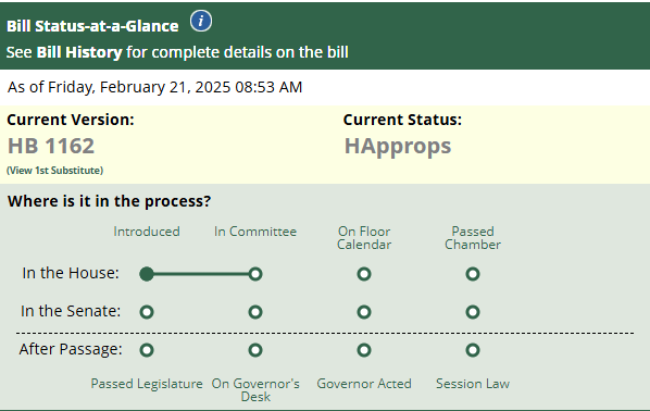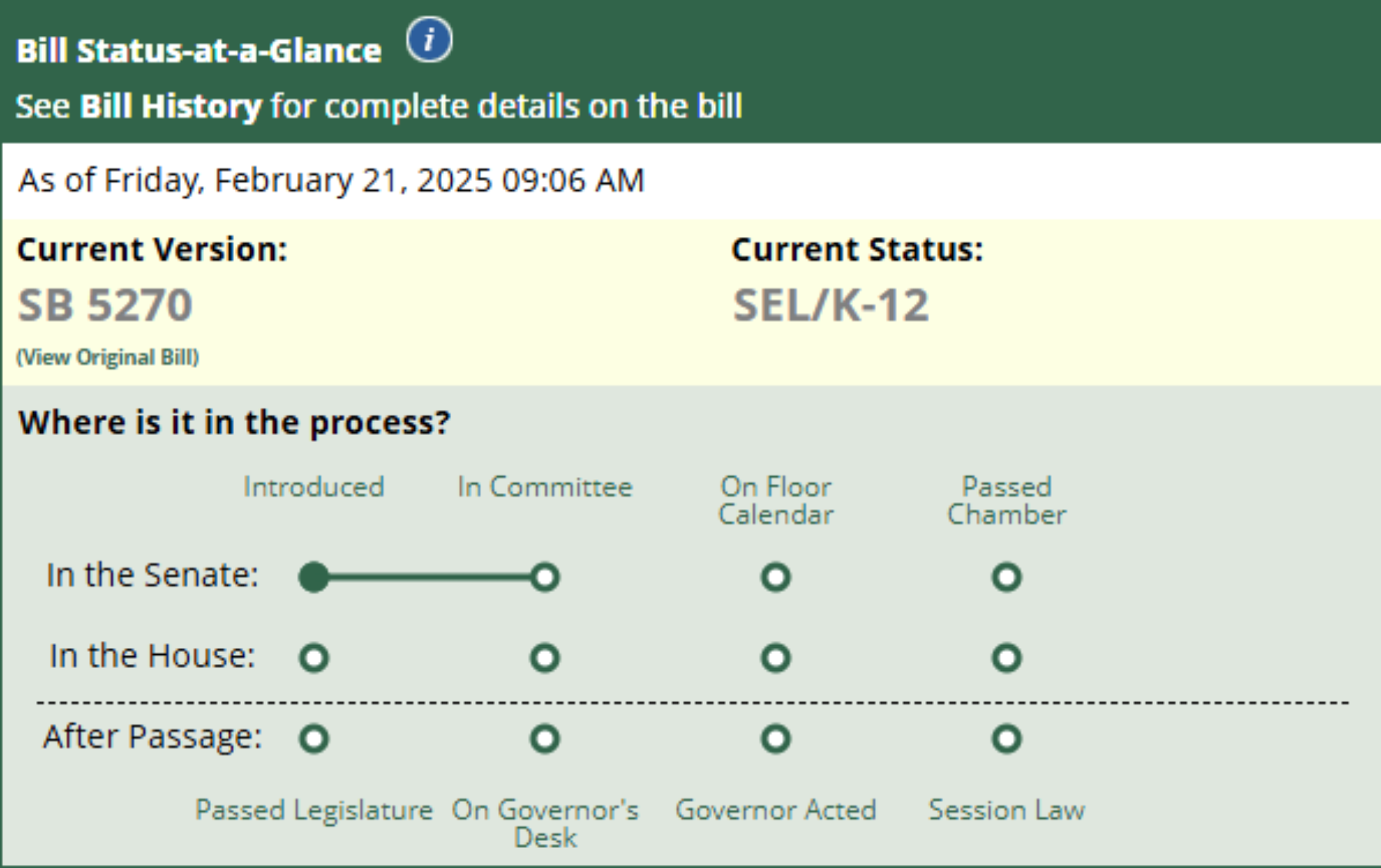
WSNA in Olympia — 2025 Legislative Session
February 21, 2025. In this week's update - an overall recap of the week, updates on each of WSNA's five legislative priorities, and other bills we're watching.
February 21, 2025 • 5 minutes, 5 seconds to read
In this week's update - an overall recap of the week, updates on each of WSNA's five legislative priorities, and other bills we're watching.
The 2025 legislative session is now one third of the way over. Friday, February 21st was the cutoff for bills to be voted out of policy committees in the House of Origin. Fewer than 20% of bills introduced become law and this was the first of the hurdles bills must jump to stay alive. It is a very quick turnaround until the next cutoff Friday, February 28th, where bills with a fiscal impact to the state budgets must be voted out of the main fiscal committees: Finance, Appropriations, Transportation, and Ways & Means.
Between now and then, legislators will spend long days and nights in those committees hearing and voting on bills. There is of course a great deal of gray area there, as bills that are deemed by majority leadership to be “necessary to implement the budget” or “NTIB,” are exempt from these cutoffs. This designation is used to prevent majority party legislation from dying, allowing action until the gavel drops on Sine Die. Bills with minimal or no fiscal impact advance directly to the Rules Committee for further consideration.
On Friday, February 21, the House Democrats released a website showing what they suggest a no-revenue budget looks like. We will continue to keep you updated on the legislature's plan to address the budget shortfall.

HB 1162 currently sits in the House Appropriations Committee with a fiscal note from DSHS that staff are working to reduce. It must pass out of that committee by the fiscal committee cutoff date, February 28th. If passed, the bill would move to the Rules committee for a potential vote by the full House.

Given the state’s budget outlook, HB 1881 the mergers and acquisitions bill (also known as KOCA in past years), unfortunately did not pass out of committee before February 21st policy cutoff and will not continue any further this session. WSNA is committed to working on this policy over the interim with other supporters and interested parties.
HB 1881 establishes a process where the merger, acquisition, or contracted affiliation is reviewed to ensure those transactions do not result in reduced access to quality, affordable care and services.

SB 5041 sits in the Senate Ways & Means Committee to take a closer look at the cost to the state. The bill will need to have a public hearing and a vote by the February 28th fiscal committee cutoff to “stay alive” this legislative session.
This bill would allow striking workers to access UI benefits. It would put pressure on the bargaining parties to come to the table and restores the power imbalance between workers and employers.

SB 5270 did not pass out of the Senate Early Learning & K-12 Committee before the February 21st policy cutoff. This bill did not pass this legislative session and is considered “dead.” While there is support for school nurses to be included in the BEST mentor program, there was concern from some groups about prioritizing one profession over another. The school districts of Washington State are also experiencing a number of financial difficulties as well for a number of reasons.
The Beginning Education Support Team (BEST) is a mentorship program for new school employees, and we want to expand that to novice school nurses. The BEST bill would help support and retain school nurses, especially in rural school districts, by pairing them with a nurse mentor and support system. We will continue to work with SNOW on this priority over the interim.

HB 1430 moved from the House Rules Committee to the House Floor Calendar. The House Floor Calendar identifies bill and resolutions awaiting House floor action. The bill must pass the House of Representatives by a simple majority in order to move on to the next phase in the Senate.
The quality of care and outcomes from services provided by ARNPs and PAs are equivalent to that of physicians, but commercial insurance plans withhold up to 15% of the reimbursement from ARNPs and PAs. HB 1430 requires commercial insurance plans to reimburse ARNP and PA care at the same rate as physicians.
The legislature considers hundreds of bills outside our own legislative priorities. Here is a list of bills we’re watching as they move through the legislative process that may impact members. We will continue adding bills to this list as we move through the legislative session. Click on any of the links to learn more about each bill and where it is in the legislative process.
NEW! HB 1308/SB 5345, concerning access to personnel records
NEW! HB 1213/SB 5539, expanding protections for workers in the state paid family and medical leave
NEW! HB 1416, increasing tobacco and vapor products taxes
NEW! HB 1948/SB 5652, reducing environmental and health disparities and improving the health of Washington residents in large port districts
NEW! SB 5116, concerning the immediate use of marriage licenses for medical necessity
HB 1764/SB 5578, concerning labor standards
HB 1879, concerning meal and rest breaks for hospital workers
HB 1784, concerning medical assistants
HB 1672, addressing technology used by employers in the workplace
SB 5044, allowing bargaining over contributions for certain supplemental retirement benefits
SB 5101, expanding access to leave and safety accommodations to include workers who are victims of hate crimes or bias incidents
HB 1203/SB 5183, prohibiting the sale of certain tobacco and nicotine products
HB 1334, modifying the annual regular property tax revenue growth limit
SB 5503, concerning public employee collective bargaining processes
HB 1686/SB 5561, creating a health care entity registry
HB 1560, funding health care access by imposing an excise tax on the annual compensation paid to certain highly compensated hospital employees
SB 5240, concerning anaphylaxis medication in schools
SB 5335, establishing the rural nursing education program
HB 1675/SB 5387, concerning the corporate practice of medicine
SB 5526, concerning the regulation of tobacco products, alternative nicotine products, and vapor products
SB 5493, concerning hospital price transparency
HB 1622/SB 5422, allowing bargaining over matters related to the use of artificial intelligence
SB 5271, requiring school districts of the first class to employ a school nurse
HB 1445/SB 5233, developing the Washington health trust
HB 1567, concerning licensure of health care administrators
HB 1077, raising awareness of pain control options for intrauterine device placement and removal
HB 1531, preserving the ability of public officials to address communicable diseases
HB 1022, creating a home for heroes program.
HB 1069/SB 5044, allowing collective bargaining over contributions for certain supplemental retirement benefits.
HB 1155/SB 5437, prohibiting noncompetition agreements and clarifying non solicitation agreements.
HB 1213, expanding protections for workers in the state paid family and medical leave program.
HB 1220, concerning appropriate response to assaults by individuals in behavioral health crisis.
Interested in learning more about the legislative process? See below for resources.
How does a bill become a law? Find out here.
To view the Washington State Labor Council’s 2025 Legislative Priorities: click here.

Congress is considering a proposal that would make federal cuts to Medicaid and other supportive programs. That would leave the states to fill in the gap by either raising revenue or cutting spending. Cuts to Medicaid could mean eliminating coverage for children, parents, working adults or those who might need long term care; limiting benefits; or cutting payment rates for health plans or providers. The federal cuts will also have dramatic impacts on rural hospitals and rural community members’ access to care. More than 1.1 million people in Washington are enrolled in Medicaid, and a strong Medicaid program is essential for the healthcare delivery system.
Click here if you would like to contact your Member of Congress opposing federal cuts to Medicaid. You will be directed to AFT’s action alert, where you first fill out your information, and then the letter you send to your Member of Congress can be edited before submittal.
Learn more about Medicaid here.







